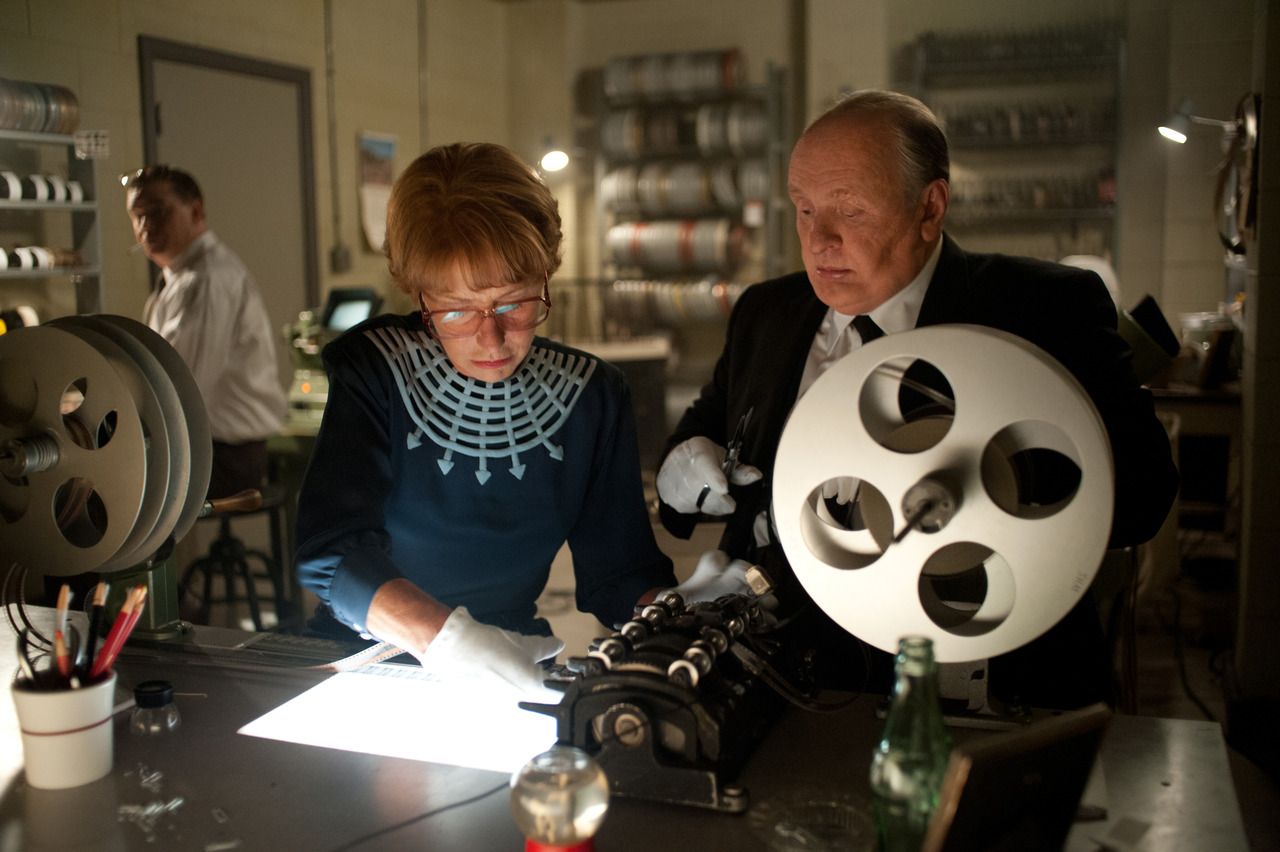Much like Norman Bates, the main character in Psycho, Hitchcock bears two faces. One face is very solid and understood, the other is sickly and needs help. When Hitchcock is exploring the relationship between Hitchcock and his long suffering wife, Alma Reville, the story is a rousing success. When exploring the Master of Suspense’s creative process when crafting Psycho, Hitchcock can range from fascinating to overreaching. Overall, Hitchcock is an all-encompassing study in Alfred Hitchcock and the many sides of his personality.
Psycho was one of Alfred Hitchcock’s most successful and treasured films, but the process to create it was no picnic. Mr. Hitchcock (Anthony Hopkins) chose Psycho instead of his wife Alma’s (Helen Mirren) suggestion of their “mutual” friend Whitfield Cook’s (Danny Houston) screenplay. From there Hitchcock, Alma, and their secretary (Toni Collette) fight the financial backers, the sensors, and the actors as they attempt to make the film. Things get more complicated when Alma starts to spend more time with Mr. Cook’s screenplay, and Alfred thinks there may be more going on than meets the eye.
The title of Hitchcock should be The Hitchcocks. Hitchcock is at its best when featuring the relationship between Alfred and Alma. As an older couple, they are pretty set in their ways, and Alma desires a change at the exact time Alfred needs her to be herself. Her desires are very complicated: she is very much Alfred’s equal in the directing and editing process, but she accepts none of the credit and just wants one opportunity to share something equally publicly without it affecting her husband. On the other side, Alfred is such a wierd guy who clearly was hurt by women in the past; thus he enjoys casting his fantasy women in his movies to play out his desires on film. In the process he takes for granted all the sacrifices he asks of his wife for his personal gain, even though he clearly loves and trusts Alma with his most personal thoughts. This less than normal love story provides the central story for Hitchcock to build the making of Psycho around.
When Hitchcock revolves around the process of Psycho, the results are more mixed. The inspiration for the novel Psycho is used in dream sequences to talk to Alfred Hitchcock to try to showcase his macabre interest in murderers and death. This should be cutting room material as it is very disjointed from the overall tone of the movie and jars significantly from Hitchcock’s pace. His death obsession is best shown in little press featurettes and his reaction to the audience’s first reaction to the shower scene. The more subtlety, the greater the effect because it seems more fitting to this story. Director Sasha Gervasi uses Janet Leigh (Scarlett Johansson) and Vera Miles (Jessica Biel) as surrogates for Alfred Hitchcock’s past and present relationship with Alma and how he has evolved in his view towards women. The rest of the actors in Psycho are not as necessary, although James D’Arcy is eerily good as Anthony Perkins. Overall, it seems like the editors couldn’t decide what to use, so they threw as much as they could and kept most of what was useful. Hitchcock’s creative process hits more than it misses, but when it misses it takes a minute or two to recover.
Anthony Hopkins and his fat suit do a good job as Alfred Hitchcock. He does good voiceovers and does subtle effective work with his peeping nature, gallows humor, and personal drive. Hitchcock is supposed to be a vehicle for a Hopkins Oscar Nomination, but Helen Mirren’s emotional resonance is much more impressive. Like her character, Mirren is forced to be second fiddle to Hopkins, but this makes it easy for her to relate to the character and convey Alma’s complicated feelings effortlessly. The rest of the cast is fine, but none of the characters get interesting arcs other than Scarlett Johansson’s Janet Leigh (although it was awesome to see Ralph Macchio).
When I watch Psycho again, I will watch with a clearer understanding of what the Hitchcocks went through when crafting Psycho. Ignoring the “financial” troubles and some of the creative process, Hitchcock paints the married couple in a very positive light through the depth of their trust and honesty as a couple. I learned that even someone as creepy and self-important as Alfred Hitchcock can learn to love, even if the couple falls in love over their joint undertaking of a cross-dressing bipolar muderer movie.

